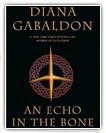Outlander aka Cross Stitch - Gabaldon Diana (библиотека электронных книг txt) 📗
“That,” I said primly, “is an areola, and you know it, because I told you last week.”
“So ye did,” he murmured. “And there’s another one, fancy that.” The bright head dipped to let his tongue replace the finger, then traveled lower.
“Umbilicus,” I said with a short gasp.
“Um,” he said, muffled lips stretching in a smile against my transparent skin. “And what’s this, then?”
“You tell me,” I said, clutching his head. But he was incapable of speech.
Later I lounged in my surgery chair, basking dreamily in memories of awaking in a bed of sunbeams, sheets tumbled in blinding shoals of white like the sands of a beach. One hand rested on my breast, and I toyed idly with the nipple, enjoying the feel of it rising against my palm beneath the thin calico of my bodice.
“Enjoying yourself?”
The sarcastic voice from the door brought me upright so quickly that I bumped my head on a shelf.
“Oh,” I said, rather grumpily. “Geilie. Who else? What are you doing here?”
She glided into the surgery, moving as though on wheels. I knew she had feet; I’d seen them. What I couldn’t figure out was where she put them when she walked.
“I came to bring Mrs. Fitz some saffron from Spain; she was wanting it against the Duke’s coming.”
“More spices?” I said, beginning to recover my good humor. “If the man eats half the things she’s fixing for him, they’ll need to roll him home.”
“They could do that now. He’s a wee round ball of a fellow, I’ve heard.” Dismissing the Duke and his physique, she asked whether I’d like to join her for an expedition to the nearby foothills.
“I’m needing a bit of moss,” she explained. She waved her long, boneless hands gracefully to and fro. “Makes a wonderful lotion for the hands, boiled in milk with a bit of sheep’s wool.”
I cast a look up at my slit window, where the dust motes were going mad in the golden light. A faint scent of ripe fruit and fresh-cut hay floated on the breeze.
“Why not?”
Waiting as I gathered my baskets and bottles together, Geilie strolled about my surgery, picking things up and putting them down at random. She stopped at a small table and picked up the object that lay there, frowning.
“What’s this?”
I stopped what I was doing, and came to stand beside her. She was holding a small bundle of dried plants, tied with three twisted threads; black, white, and red.
“Jamie says it’s an ill-wish.”
“He’s right. Where did ye come to get it?”
I told her about the finding of the small bundle in my bed.
“I went and found it under the window next day, where Jamie threw it. I meant to bring it round to your house and ask if you knew anything about it, but I forgot.”
She stood tapping a fingernail thoughtfully against her front teeth, shaking her head.
“No, I canna say that I do. But there might be a way of finding out who left it for ye.”
“Really?”
“Aye. Come to my house in the morning tomorrow, and I’ll tell ye then.”
Refusing to say more, she whirled about in a swirl of green cloak, leaving me to follow as I would.
She led me well up into the foothills, galloping when there was road enough to do so, walking when there wasn’t. An hour’s ride from the village, she stopped near a small brook, overhung by willows.
We forded the brook and wandered up into the foothills, gathering such late summer plants as still lingered, together with the ripening berries of early autumn and the thick yellow shelf fungus that sprouted from the trunks of trees in the small shady glens.
Geilie’s figure disappeared into the bracken above me, as I paused to scrape a bit of aspen bark into my basket. The globules of dried sap on the papery bark looked like frozen drops of blood, the deep crimson refulgent with trapped sunlight.
A sound startled me out of my reverie, and I looked up the hill, in the direction it seemed to come from.
I heard the sound again; a high-pitched, mewling cry. It seemed to come from above, from a rocky notch near the crest of the hill. I set my basket down and began to climb.
“Geilie!” I shouted. “Come up here! Someone’s left a baby!”
The sound of scrabbling and muttered imprecations preceded her up the hill, as she fought her way through the entangling bushes on the slope. Her fair face was flushed and cross and she had twigs in her hair.
“What in God’s name-” she began, and then darted forward. “Christ’s blood! Put it down!” She hastily snatched the baby from my arms, then laid it back where I had found it, in a small depression in the rock. The smooth, bowlshaped hollow was less than a yard across. At one side of the hollow was a shallow wooden bowl, half-full of fresh milk, and at the baby’s feet was a small bouquet of wildflowers, tied with a bit of red twine.
“But it’s sick!” I protested, stooping toward the child again. “Who would leave a sick child up here by itself?”
The baby was plainly very ill; the small pinched face was greenish, with dark hollows under the eyes, and the little fists waved weakly under the blanket. The child had hung slack in my arms when I picked it up; I wondered that it had had the strength to cry.
“Its parents,” Geilie said briefly, restraining me with a hand on my arm. “Leave it. Let’s get out of here.”
“Its parents?” I said indignantly. “But-”
“It’s a changeling,” she said impatiently. “Leave it and come. Now!”
Dragging me with her, she dodged back into the undergrowth. Protesting, I followed her down the slope until we arrived, breathless and red faced, at the bottom, where I forced her to stop.
“What is this?” I demanded. “We can’t just abandon a sick child, out in the open like that. And what do you mean, it’s a changeling?”
“A changeling,” she said impatiently. “Surely you know what a changeling is? When the fairies steal a human child away, they leave one of their own in its place. You know it’s a changeling because it cries and fusses all the time and doesn’t thrive or grow.”
“Of course I know what it is,” I said. “But you don’t believe that nonsense, do you?”
She shot me a sudden strange look, full of wary suspicion. Then the lines of her face relaxed into their normal expression of half-amused cynicism.
“No, I don’t,” she admitted. “But the folk here do.” She glanced nervously up the slope, but no further sound came from the rocky notch. “The family will be somewhere near about. Let’s go.”
Reluctantly, I allowed her to tow me away in the direction of the village.
“Why did they put it up there?” I asked, sitting on a rock to remove my stockings before wading across a small stream. “Do they hope the Wee Folk will come and cure it?” I was still bothered about the child; it seemed desperately ill. I didn’t know what was wrong with it, but perhaps I could help.
Maybe I could leave Geilie in the village, then come back for the child. It would have to be soon, though; I glanced up at the eastern sky, where soft grey rain clouds were swiftly darkening into purple dusk. A pink glow still showed to the west, but there could be no more than half an hour’s light left.
Geilie looped the twisted withy handle of her basket over her neck, picked up her skirt and stepped into the stream, shivering at the cold water.
“No,” she said. “Or rather, yes. That’s one of the fairies’ hills, and it’s dangerous to sleep there. If ye leave a changeling out overnight in such a place, the Folk will come and take it back, and leave the human child they’ve stolen in its place.”
“But they won’t, because it isn’t a changeling,” I said, sucking in my breath at the touch of the melted snow water. “It’s only a sick child. It might very well not survive a night in the open!”
“It won’t,” she said briefly. “It will be dead by morning. And I hope to God no one saw us near it.”
I stopped abruptly in the midst of putting on my shoes.



